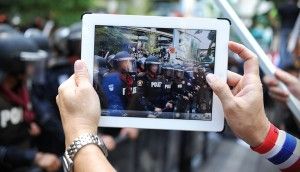All eyes on CA police bodycam policy
by James Poulos | May 7, 2015 5:00 am
 [1]Body cameras for police officers have reached the forefront of California’s legislative agenda.
[1]Body cameras for police officers have reached the forefront of California’s legislative agenda.
After a spate of enforcement scandals that raised the ire of many in Los Angeles, bodycams began to catch on as a policy measure that could shield police from wrongful litigation and protect citizens from civil rights abuses.
But with continued nationwide unrest surrounding police misconduct — culminating in presidential candidate Hillary Clinton voicing support for nationwide body cameras — the significance of California’s approach to the technology took on an increased importance.
Controversial legislation
In an effort to tip the balance of the bodycam advantage less in favor of police, Assemblywoman Shirley Weber, D-San Diego, introduced AB 66, a bill intended to limit police access to material videotaped on their own bodycams.
“By a 5 to 1 vote, the Assembly Public Safety Committee approved AB 66, which includes the controversial provision that prohibits police officers from viewing body camera footage before writing their reports,” U-T San Diego noted[2]. According to Weber and the civil libertarians supporting her proposal, the importance of keeping bodycam evidence under wraps outweighs the inconvenience police will face as a result.
But, as NPR reported[3], “many law enforcement groups aren’t buying that. They have rallied in opposition to the measure, saying it that would undermine accurate police reports — and that it presumes that the police will lie.”
Interviewed previously by U-T San Diego, “Weber said the primary role of body cameras is to de-escalate incidents between police and the general public, not to serve as a reference for officers as they write reports.”
A rival workaround
While Sacramento and law enforcement debate the bill, California’s ACLU chapter has taken matters into their own hands. A new app created by the group, called “Mobile Justice CA,” gave users the ability to “record cell phone videos of possible cases of police misconduct and then quickly save the footage to the organization’s computer servers,” as Reuters reported[4]. “The California chapter of the American Civil Liberties Union said the app will send the video to the organization and preserve it even if a phone is seized by police or destroyed.”
Mobile Justice CA will even push an alert to nearby users’ phones, allowing them to seek out the location of the possible misconduct and observe the situation firsthand.
Municipal disagreement
The city of Los Angeles, which pioneered the gradual introduction of bodycams into a troubled metropolitan environment, also took fresh steps to implement a more formal regime regulating the way the devices are used.
The L.A. Police Commission recently voted to codify new rules covering bodycams, but not without a fight. As CBS Los Angeles reported[5], “Commissioner Robert Saltzman cast the lone dissenting vote after an often-contentious debate that lasted nearly two hours, saying he was ‘frustrated’ that commissioners and the public were not able to view and comment on the policies before the LAPD reached an agreement with the police officers’ union.”
But Commission President Steve Soboroff, an early and vocal supporter of the cameras, “argued that the public has had many opportunities to give input and that the commission will have the opportunity to re-assess the policies once the officers have actually put the body cameras to use.”
Election-year politics
Adding a final layer of complexity to the clash of interests around body cameras, state Attorney General Kamala Harris, currently angling to replace outgoing Sen. Barbara Boxer, D-Ca., has vowed to equip special agents employed by the state Department of Justice with bodycameras of their own. “With increased focus on allegations of racial bias and police violence across the country, Harris earlier this year directed her division of law enforcement to review the Justice Department’s own special agent training on implicit bias and use of force,” the Sacramento Bee noted[6].
- [Image]: https://calwatchdog.com/wp-content/uploads/2015/04/videotaping-police.jpg
- noted: http://www.utsandiego.com/news/2015/apr/14/sacramento-police-body-camera-AB-66/
- reported: http://www.npr.org/2015/05/01/403316673/oakland-laws-could-limit-police-access-to-body-camera-footage
- reported: http://www.reuters.com/article/2015/04/30/us-usa-police-apps-idUSKBN0NL2SK20150430
- reported: http://losangeles.cbslocal.com/2015/04/28/la-police-commission-to-review-proposed-rules-for-body-cameras/
- noted: http://www.sacbee.com/news/politics-government/capitol-alert/article18792072.html
Source URL: https://calwatchdog.com/2015/05/07/eyes-ca-police-bodycam-policy/